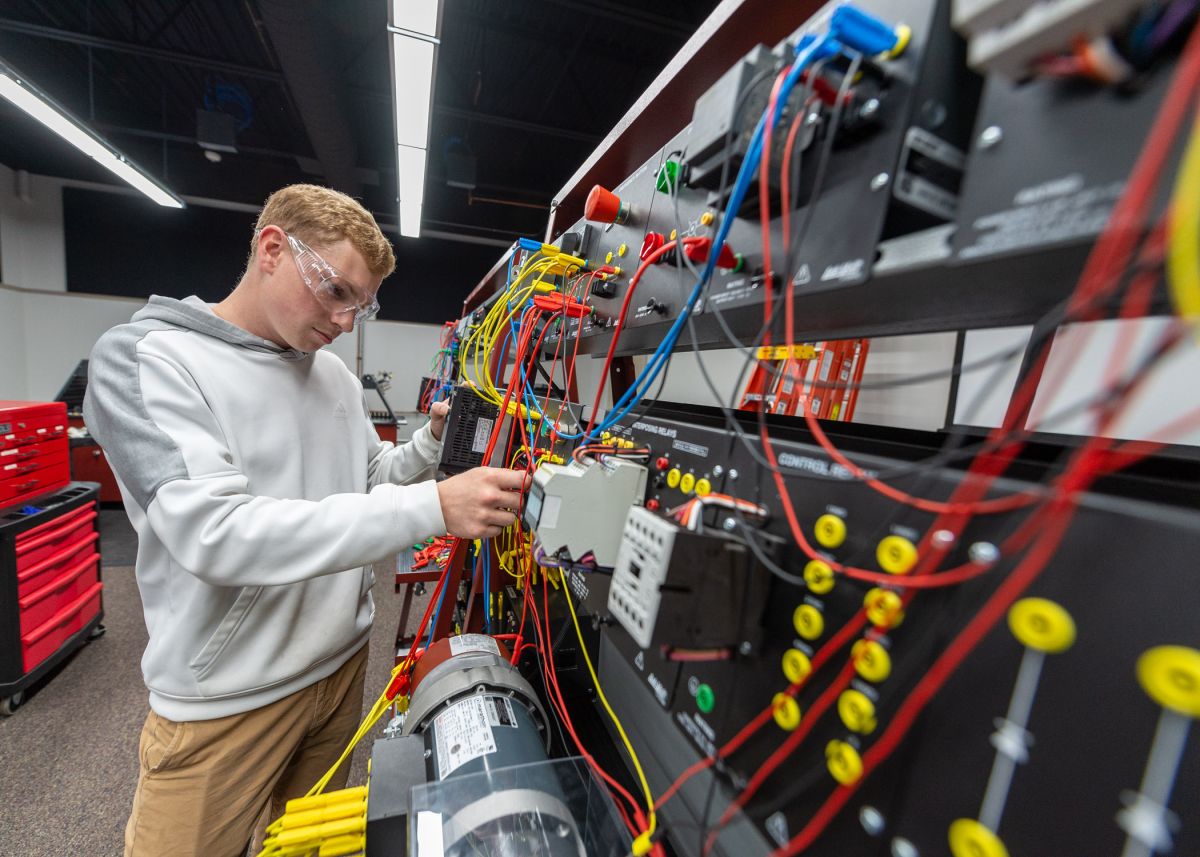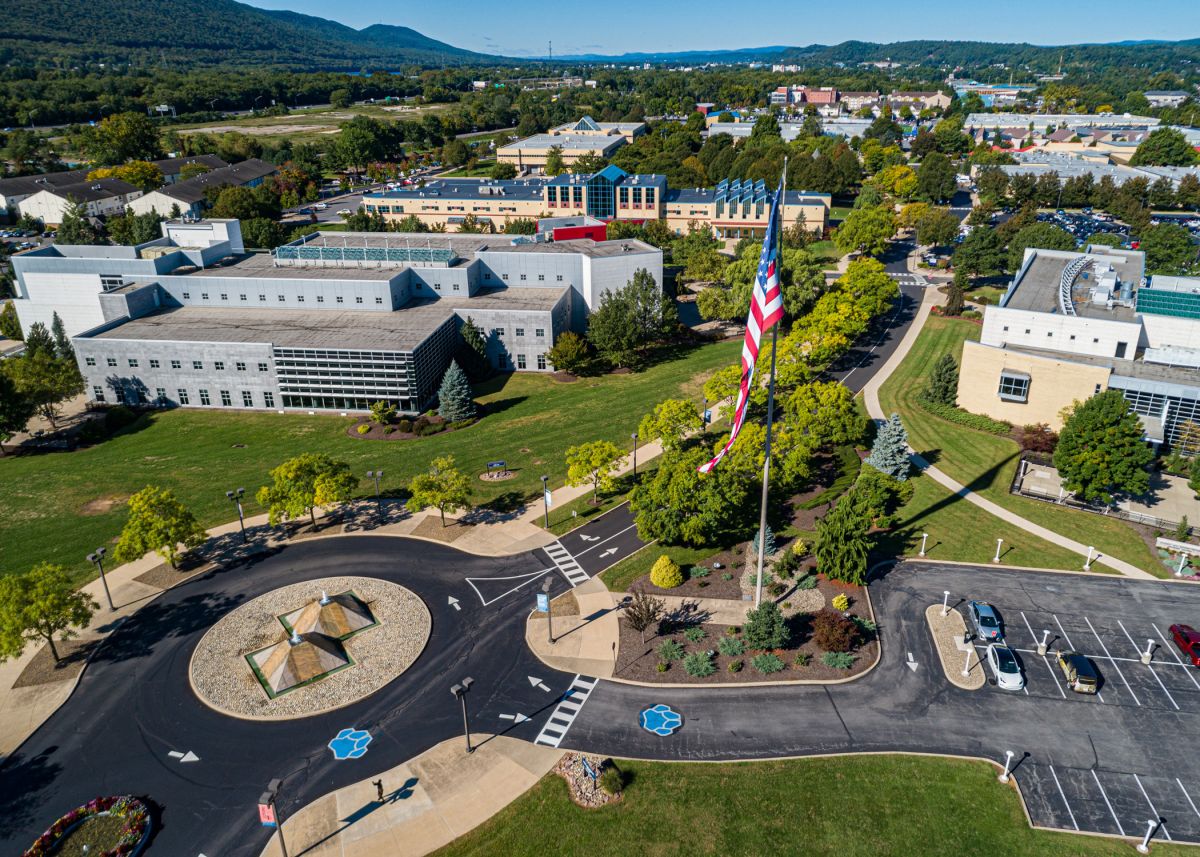By Jodie Dello Stritto

Electronics and Computer Engineering Technology. Photo: Provided.
Williamsport-based Penn College, a special mission affiliate of Penn State, recently celebrated five top 10 rankings in the Regional Colleges North category in the latest U.S. News & World Report:
- #6 in Regional Colleges North
- #2 in Best Colleges for Veterans
- #2 in Best Undergraduate Teaching (tie)
- #3 in Most Innovative Schools
- #4 in Top Public Schools
That’s not all. The school boasts an average 96% placement rate for graduates over the last three years thanks to partnerships with more than 500 companies for workforce development and apprenticeship programs.
The secret to its success is no secret, though: Hands-on learning works, not only for job placement and career preparation, but also for making the most of a student’s college experience — and their time and money.
“I was a disinterested student in high school, but I was into computer programming and music, so that’s where I put my energy,” said Eli Hughes, co-founder at TZero and NPC Connected Solutions; pro support engineer at NXP Semiconductors; and a graduate of Penn College. “I intended to go to Berklee College of Music but took a tour at Penn College after a recruiter visited our school. My dad studied electronics there in the 60s when it was [Williamsport Area Community College] and he encouraged me to check it out.”

Eli Hughes, co-founder at TZero and NPC Connected Solutions; pro support engineer at NXP Semiconductors; and a graduate of Penn College. Photo: Provided.
Walking through the electronics department on his tour was a game-changer, Hughes said. “The work I saw happening was so much more than I realized was possible. They were controlling robots, working with automation, writing software that was interacting with the physical world … That was appealing.”
At the time, electronics engineering technology was a fairly new, four-year program at Penn College that required calculus and physics, just like a traditional engineering program. For a guy with little interest in school and grades, this path might have seemed less than ideal, but, according to Hughes, the environment made all the difference.
“The environment was perfect. Right away, I could do what I wanted to do,” he said. “It was the ideal experience for me because there, you are in the core material right away. Class sizes are smaller and, right off the bat, you get the instant gratification of hands-on experience.”
Hands-on learning led Hughes to discover that the technology he loved wasn’t magical; it could be figured out and wasn’t as complicated as he assumed. His desire to figure things out manifested in personal projects — a lot of them.
“Because the school has strong industry connections, the programs address real and current industry needs and graduates are highly regarded in technical fields for having hands-on experience.”
“I had more personal projects than the average student. Many days I was in the electronics area from 8 a.m. until 10 p.m., by choice. I was all-in,” he said. “Once I figured something out, I wanted to build my own. I had the right advisor and really good instructors who encouraged me in these projects and created an environment where I could thrive.”
Hughes offered some advice to high school students who are considering their options for college and career: be open to the possibilities.
“My expectations going into college were so different from the reality when I got there. I was ignorant of the possibilities. I was into music and electronics. I thought I wanted to work for a company that made musical instruments, but Penn College opened me up to so much more,” he said. “It helped me to realize I wasn’t dreaming big enough.”
Hughes went on to earn a master’s in acoustics from Penn State and is close to completing a PhD, which he put on hold to pursue his entrepreneurial interests, and said Penn College was an ideal first step.
“Because the school has strong industry connections, the programs address real and current industry needs and graduates are highly regarded in technical fields for having hands-on experience,” he said. “It’s also a great start for moving into graduate work.”

Pennsylvania College of Technology. Photo: Provided.
He added that there’s another big benefit to the hands-on model: “Especially in programs that are specialized, you get into the work right away and you know in a semester or two if it’s right for you for a career. You don’t get as far as your junior or senior year and realize, uh-oh, you don’t actually like it.”
“It helped me to realize I wasn’t dreaming big enough.”
Kim Cassel, college relations director at Penn College, echoed Hughes’ thoughts: “Penn College is unique from other colleges and universities because of the hands-on learning opportunities we provide. Our students spend so much more time in labs than they ever do in the classroom, which allows them to transition into the workplace seamlessly. I don’t think parents and students can fully appreciate the life-changing experiences we provide until they arrive on campus. Not only does Penn College have state-of-the-art facilities, but our faculty and staff are the most caring and hard-working individuals you will meet.”
When Hughes was a student at Penn College, the college was just adding more on-campus housing, so he acknowledged that his social experience was based more on off-campus living, but he believes the size of the school matters. “It’s not a big, big school and it’s not on an infinite growth trajectory. Penn College is doing what it knows it can do really well. This is a big positive because class sizes are important, and there are enough people that there’s a lively but manageable social element and campus life where you can get to know people,” he said.
“Our students are welcomed into the Wildcat community and made to feel a part of the family from day one. In addition, our location in the Williamsport area has so much to offer. From hiking and biking trails to restaurants, coffee shops and theatres, you will never run out of things to explore. We are also a short drive to many major cities, which provide even more opportunities to enhance the collegiate experience,” Cassel added.

